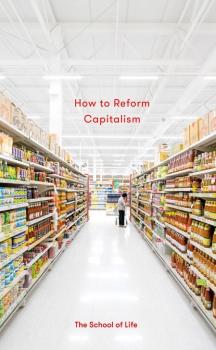Essay Books
Скачать книги из серии Essay BooksHow to Reform Capitalism
It is quite normal to feel frustrated and sorrowful about aspects of modern capitalism, but realistic hope of change can seem either utopian or demented. In fact, the way that capitalism works is inherently open to alteration and improvement. This is because the problems of capitalism are, in their essence, not about money, law or politics, but about human psychology – the field of expertise of The School of Life.
As this hugely original essay argues, the path to a better sort of capitalism starts with a clear-eyed understanding of our emotional functioning and the workings of our psyches.
Why We Hate Cheap Things
We don’t think we hate cheap things – but we frequently behave as if we rather do. Consider the clean cotton t-shirt.
We wouldn't regard this as a particularly stylish fashion choice, and certainly not as a glamorous one. We are unlikely to stare wistfully at a cotton t-shirt in a shop window, or buy one in anticipation of a special event. We don't luxuriate in the feel of the fabric when we pull the freshly laundered garment over our head – yet Louis XVI would have been deeply impressed by this rare and decadent phenomenon.
The t-shirt itself has not changed; only our attitude to it. When we have to pay a lot for something nice, we appreciate it to the full. Yet as its market price falls, passion has a habit of fading away. It’s a pattern that we see recurring in a range of areas – and it’s a cultural misfortune. We need to rethink our patterns of consumption.
This entertainingly informative book considers how to do so, and shows how more of the things we could love are already to hand. We might be surprised to find that we are already a good deal richer than we are encouraged to think.
What Is Psychotherapy?
• A guide to the purpose and meaning of psychotherapy that normalises and demystifies a useful but misunderstood practice.
• Challenges the misconception of ‘innate’ qualities and explores the role of psychotherapy in correcting our learnt behaviour.
• Identifies four key areas of ourselves in greatest need of repair and work:
– Self-Love
– Candour
– Communication
– Trust
• Debunks myths and addresses traditional causes of suspicion surrounding therapy, instead outlining realistic potential outcomes using case studies as examples.
• Beautifully produced, premium gift format.
What Is Culture For?
Our societies frequently proclaim their enormous esteem for culture. Music, film, literature and the visual arts enjoy high prestige and are viewed by many as getting close to the meaning of life. But what is culture really for?
This book proposes that works of culture were all made, in one way or another, with the idea of improving the way we live. The book connects a range of cultural masterpieces with our own pains and dilemmas around love, work and society, and invites us to see culture as a resource with which to address the complex agonies of being human. It provides us with enduring keys to unlocking culture as a way of transforming our lives.



